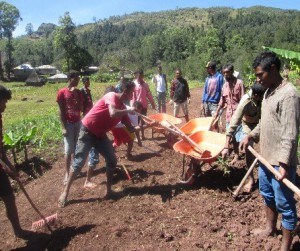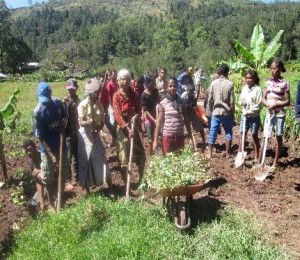Suku Fatubosa is participating in the first phase of the PNDS program. The village reicved an annual grant of US$45,000.00, divided into two categories: infrastructure funds of US$39,000.00 and operational funds of US$5,500.00.
In Fatubosa, the community proposed two priorities to be financed by the PNDS grant. One is to build a community centre in aldeia Kulau, at a cost of US$22,464.27, and the other proposal is to rehabilitate 1.5km of local road, in aldeia Erhetu, costing US$17,035.73.
Manuel Mendonca, president of EIP (Program Implementation Team) in Fatubosa, is proud of the PNDS program as it directly benefits the community.
“We are happy because the Government of Timor-Leste, through PNDS, is helping us, as PNDS is not only about construction but also teaching our community to identify our problem and manage the budget allocated to our village,” he said.
The community is currently implementing the priority proposals based on the funds they received. PNDS implementation in this suku has had a lot of success, generating wide-ranging participation from the community.
“Our community is ready to work even with small incentives, as we have the principles of before we are fighting against the colonialist to free our land, but now we are fighting for development”, said Manuel Mendonca.
Community ensures a history of development success, in suku Fatubosa
Suku Fatubosa is located in Aileu sub district, Aileu district. The village name comes from the Mambae (local dialect) word Hatu-Bos, meaning hatu=stone and bos=beautiful.
The village borders with suku Lahae in the east, suku Olopana and suku Eraulo from Ermera to the west, Maubisi sub district of Ainaro to the south, and suku Liurai to the north.
Based on 2010 Population Census, Fatubosa has a total population of 1750, with 908 males and 842 females. The majority of the population speaks Mambae dialect and are farmers.
The village continues to have development success stories: in 2000 the village community, led by Manuel Mendonça (currently the president of EIP) and a former resistance veteran from this village, inspired the community to build a junior high school for the village children as it was difficult for them to go to school in Aileu Villa, which is around 15 kilometers away. The school was finally built with contribution from each household of US$2.50 per household. The Ministry of Education rehabilitated the school and it is now used as a permanent school.
In 2001, Manuel Mendonça the community of Fatubossa organized themselves and wrote a proposal for to International NGO, Care, asking for a water system for their community. With the help of Care, clean water was piped to aldeia Daisoli.
In 2004, they received assistance from NGO World Vision, to supply clean water to aldeia Fatubossa. And, in 2010 they also received clean support for a clean water system from Plan International for two aldeia, Kulau and Liklaukana.
The key to PNDS development success in this village is everyone’s participation. This story is a good example for all suku, as the achievement of this development success is also the success of Nation’s development.



